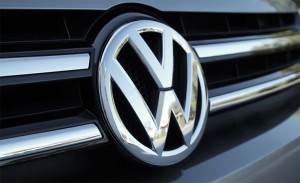Volkswagen has revealed an internal audit has found “irregularities” with the emissions – and possibly the fuel economy numbers — involving another 800,000 vehicles sold worldwide.
Significantly, the latest problem appears to impact gasoline vehicles, as well as those using diesel engines. According to the German maker, the cost of repairing the newly discovered problems could add another 2 billion euros, or nearly $2.2 billion, to the maker’s tab, on top of the $7.3 billion it has already set aside to cover the emissions cheating scandal first revealed in mid-September.
“From the very start I have pushed hard for the relentless and comprehensive clarification of events,” said Matthias Mueller, who was named CEO after the crisis began. “We will stop at nothing and nobody. This is a painful process, but it is our only alternative. For us, the only thing that counts is the truth.”
Today’s revelation comes a day after the U.S. Environmental Protection Agency alleged that VW has installed a so-called “defeat device,” software used to illegally pass emissions tests, on a 3.0-liter turbodiesel used in a number of products sold through the Volkswagen, Audi and Porsche brands.
(Click Here for more on the EPA’s latest allegations.)
The EPA touched off the VW scandal when, on September 18th, it announced that VW had used the same sort of software to disguise the fact that its 2.0-liter EA 189 diesel engine didn’t comply with Clean Air Act standards. In real-world use, the vehicles produce as much as 40 times more smog-causing oxides of nitrogen than the mandate allows.
VW has denied that it cheated on tests involving the 3.0-liter diesel. But it says that it has discovered some other problems as part of an internal review. In this case, they produce more carbon dioxide than allowed under regulations for Europe and other parts of the world.
“Under the ongoing review of all processes and workflows in connection with diesel engines it was established that the CO2 levels and thus the fuel consumption figures for some models were set too low during the CO2 certification process,” VW said in a statement.
And while the maker noted that, “The majority of the vehicles concerned have diesel engines,” the VW announcement appears to indicate that, for the first time, it is confirming it cheated on testing for its gasoline engines, as well.
The latest announcement reveals a two-fold problem. The first involves CO2 emissions, but VW apparently misreported fuel consumption numbers, as well. While the U.S. calculates the number of miles a vehicle gets to a gallon of fuel, Europe and most other countries look at how many liters of fuel it takes to go a set distance – normally 100 kilometers, or about 62.5 miles. In this case, the higher the number the worse the vehicle’s fuel efficiency.
VW would not be the first manufacturer to report inaccurate numbers. Ford, as well as Korean siblings Hyundai and Kia were fined for overstating there mileage numbers in the U.S.
(VW loses nearly $2 bil in latest quarter. Click Here for more.)
Even before VW made its latest announcement, the maker came under fire from U.S. lawmakers.
“The latest revelations raise the question, where does VW’s road of deceit end?” said a statement by House Energy and Commerce Committee Chairman Fred Upton of Michigan and senior Democrat Frank Pallone of New Jersey, as well as Tim Murphy of Pennsylvania, the oversight and investigations subcommittee chairman, and senior Democrat Diana DeGette of Colorado.
VW already faces fines of up to $18 billion for cheating on emissions tests with the 2.0-liter diesel used in 482,000 vehicles sold in the U.S. It could face nearly $375,000 million more in fines if the allegations involving the 3.0-liter diesel prove accurate. It is uncertain whether the 800,000 vehicles covered by VW’s new admission were sold in the U.S.
The maker faces criminal probes in a number of countries, and there have been over 300 lawsuits filed in the U.S. alone.
Separately, VW last week said it had agreed to allow a third-party audit of the crash data it has filed in recent years under the Early Warning Report, or EWR, required by the National Highway Traffic Safety Administration. A study of the reports, which cover deaths and injuries in VW products, found seemingly glaring inconsistencies.
While federal highway records show VW products experienced a death rate on a par with the industry average, its EWR reports indicated it had only a fraction of the fatalities and injuries.
NHTSA has heavily fined both Fiat Chrysler and Honda for submitting inaccurate EWR reports this year.
(Investors flee as VW crisis worsens. Click Here for the latest.)
VW’s troubles have been hurting the company in a variety of ways. It took a sharp hit in its latest quarterly earnings, and its stock price has fallen sharply since the first diesel emissions cheating scheme was reported – dropping another 1.7% on Tuesday. Meanwhile, VW sales were virtually flat in the U.S. in October, the maker reported, even as overall U.S. sales rose about 12%.
The Audi brand, largely unscathed so far, was up nearly 17% in October. But it could feel heat from the market if the EPA’s latest accusation proves accurate.



Hi Paul,
I recently read that Winterkorn is eligible for a $66.9 million golden parachute, please tell me that this is a misprint.
Give you a call in a few days.
Best Regards,
Jim Rhodes
That IS my understanding, Jim. At this point, he has not been convicted of anything nor fired for any wrongdoing. Should something of that sort happen VW might be able to limit its financial payout but, for now, he is due whatever his contract called for.
Oh, and I’m around Friday and beyond.
Paul
I think we need more information before we can conclude what the situation is with the 800,000 vehicles with irregularities and the conflicting claims of the EPA and VW’s public statement that the 3.0L V-6 diesel engines do not have any illegal code/defeat devices. Allowing third party crash data audits and independent investigations in to the diesel emissions software issues lends credibility to VW management’s statements that they are cooperating and are only interested in the truth even though it is painful and it will be very costly.
IMO, the criminal politicians in DC, including one of their own who was convicted last week for fraud to conceal illegal sexual conduct with a minor… should keep their mouth’s tightly shut because their demons are likely to be exposed at any time even if they are or were Speaker of the House.
The article misunderstands the CO2 and fuel consumption issue.
For a start it cannot be that “they produce more carbon dioxide than allowed under regulations for Europe” because there is no set limit for individual vehicles. There is a pan-EU corporate target (similar to CAFE), but no limit on how much CO2 any one vehicle can produce.
Secondly you state this is “a two-fold problem. The first involves CO2 emissions, but VW apparently misreported fuel consumption numbers, as well.”
This is not a two-fold problem. It is one problem, which definitely affects both CO2 emissions and fuel consumption, as the two are intrinsically linked by the amount of carbon in a litre of a given fuel. If there is a problem with the CO2 emissions then there is also an equal problem with the fuel consumption.
The concern is not so much that cars are emitting more CO2 under real use than on the test (no one believes the EU CO2/consumption test results because the test cycle is so out-of-touch with reality), but that the official CO2 emissions figure is used by European governments to determine the taxes applied to the car’s purchase and ownership, and is therefore used to market the car. Any inaccuracy could mean not enough tax has been paid, and it remains to be seen how governments will tackle this issue.
They may be linked under regulations, but consumers are more likely to focus on being lied to about fuel efficiency v CO2 numbers. Regulators and enviros may get more upset about CO2.
Paul E.
Or VW diesel owners may not care a bit about a minute difference in stated CO2 or fuel economy data seeing as the cars deliver excellent performance and comply with all regulations. Regulators can’t fine VW if the CO2 is not limited. All they can fine VW for is misreporting the fuel consumption. Depending on how the irregularity occurred a fine may or may not even be appropriate. We’ll need more info. to reach an informed conclusion.